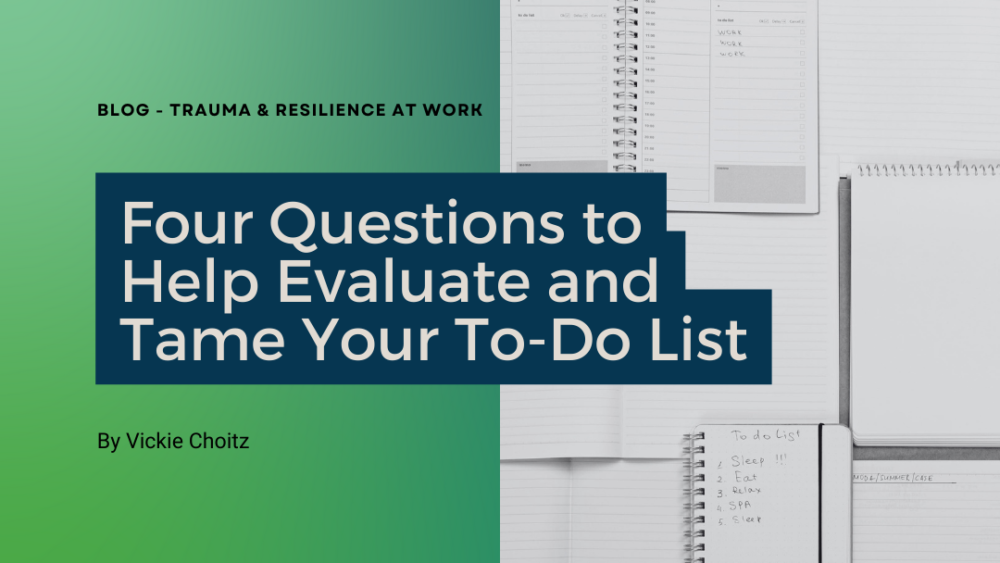The Four Question Framework
Workplace mental health is a growing concern in most workplaces. One strategy I use to protect my mental health at work by keeping my workload at a manageable level is to ask four key questions regarding every task, activity, or chore that tries to make its way onto my to do list. These four questions often help me tame my task list, and I invite you to test them out to see if they’ll make a difference for you, too. Four task list taming questions:
- Does this need to be done AT ALL?
- Does this need to be done BY ME?
- Does this need to be done NOW?
- Does this need to be done MAXIMALLY or MINIMALLY?
Does this need to be done AT ALL?
In the past, I’ve found that I’ve added items to my to do list that did not really need to be done. For example, I have sometimes been in a conversation and volunteered to send the other person a report or an article, seeing a need and knowing I could fulfill it. At the end of the conversation, I would walk away with five more (volunteered) tasks. By the end of the week, I might end up with twenty or more extra tasks. The tasks would keep piling up, and I would keep falling behind. When I finally got around to sending the items, often the recipients had completely forgotten about them. I had stressed out for nothing! That’s when I vowed, I would stop volunteering to take on tasks nobody had asked for.
Does this need to be done BY ME?
Too often, we think that we are the only ones who can do a certain task and don’t trust our colleagues enough to let them do it instead. We make the mistake of thinking things need to be done exactly as we would do them and are not open enough to how others might do things. I’ve learned over the years that not everything needs to be done by me, and my colleagues can often do things better, differently, or more creatively than I can. I learn a lot from others this way! I’ve also learned that I need to stop stealing professional development opportunities from junior staff by trying to do everything myself.
Does this need to be done NOW?
As a society, we often get caught up in a culture of false immediacy, which adds so much unnecessary stress to our lives. It is true that some things do need to be done immediately or quickly, but often our deadlines are arbitrarily and self-imposed. Too often, we apply urgency to tasks that are not that urgent. Brain science supports why we do this: when we are faced with an emergency, stress hormones such as adrenaline pump through our brains and bodies. We feel alive – we’re more attentive, alert, stronger, more focused. It feels great. But our bodies are not designed for stress hormones to be surging through them all the time, which wears down our organs and bodily systems faster, making us more susceptible to disease and shorter life spans.
Because I got tired of feeling stressed out due to constantly urgent tasks and I learned from the brain science that this was incrementally killing me, I’ve started questioning the urgency of things. I space out my meeting schedule as often as possible to ensure I have breathing room during the day and throughout the week, even if this means scheduling meetings three or four weeks into the future.
At first, I thought people might balk at this, but no one has. I also provide myself and others with realistic deadlines that ensure no one will be rushed to complete a deadline. Of course, I sometimes work into the evening or on a scheduled day off to complete an urgent task or request. But, with much of my schedule fairly under control because I’ve been tough on not responding with urgency to everything, I find that I can accommodate these actual work emergencies well and recover from them quickly.
Does this thing need to be done MAXIMALLY or MINIMALLY?
Often, we think that everything needs to be done at 100%, and we overestimate what 100% is. Rather than assuming I need to apply maximum effort to everything, I ask: what’s the bare minimum and most important information my audience needs to know; and how can I get it to them in the shortest, clearest, crispest, simplest way possible? Not only does this streamlined approach to work reduce my workload, but it also improves the product for the end user.
For example, if my boss asks me in an email why I want to attend a certain conference in March, I have two choices. I could respond with several paragraphs providing details on the conference, a link to the conference website, and justification as to why I want to attend. Or I could respond with one sentence quickly answering their specific question with my justification. My busy boss probably would appreciate the second response, which is shorter and has less information to wade through and sap their mental energy. If they want more information, they’ll ask for it, and I’ll know exactly what they’re looking for. This concept was recently reinforced for me in a communications training. One of the principles was to “be kind to your readers” by giving them no more information than they actually need and providing it in a way that is as quick and easy to digest as possible.
Assessing Your Responses
There are two cautions to keep in mind about applying these questions. First, use them judiciously. One could ask these four questions of all the items on their to do list everyday, and the answer might continuously be “yes.” In that case, your workload may be too much and needs to be revisited with your supervisor and colleagues. These questions are a tool to help you think critically and intentionally about what you need to do, when, and with what degree of effort.
The second caution is that I know I can use these questions to tame my workload more than others due to privileges I have, including race and seniority. People in the workforce from more marginalized communities often must go “above and beyond” just to achieve parity in our systemic oppressive society. I acknowledge and understand this disparity. I also encourage those of us who hold a dominant identity and/or who have been in the field a long time and can get away with pushing boundaries to stop ratcheting the bar higher by constantly doing more than necessary and doing it faster than necessary. Let’s improve our workplace culture for all.
By applying these four questions to our tasks—big and small—we may be able to right-size ours and others’ expectations of what really needs to be done, how, when, and by whom. Ideally, it will make more room in our workdays for the tasks that are truly necessary, urgent, and important. Taming our task list is important for workplace mental health and work-life balance that’s essential for all of us.
Meet the Author
Vickie Choitz
Vickie Choitz is the Director of Trauma and Resilience at Work team, advancing workplaces and workforces that are culturally responsive, trauma-informed, healing-centered, resilience-building, and supportive of mental well-being. Continue Reading >>




Comments are closed.